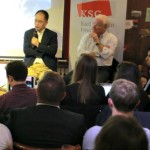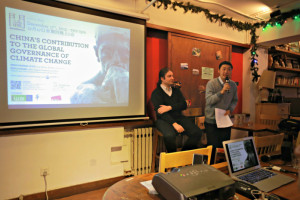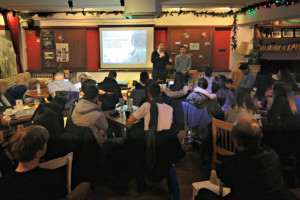-
13 Apr
ZHAO Tong
ZHAO Tong 赵通, Associate, Nuclear Policy Program, Carnegie Endowment for International Peace
ZHAO Tong is an associate in Carnegie’s Nuclear Policy Program based at the Carnegie–Tsinghua Center for Global Policy. His research focuses on strategic security issues, including nuclear arms control, nonproliferation, missile defense, strategic stability, and China’s security and foreign policy. He obtained his Ph.D in Science, Technology, and International Affairs from the Georgia Institute of Technology, an MA in International Relations from Tsinghua University and a BS in Physics from Tsinghua University.
Zhao was previously a Stanton Nuclear Security Fellow with the Managing the Atom Project and the International Security Program at the Belfer Center for Science and International Affairs at Harvard University.
He has held a number of other positions, including as a nonresident WSD-Handa Fellow at Pacific Forum CSIS and working for the Office of Foreign Affairs of the People’s Government of Beijing Municipality. He currently serves on the Executive Board of the International Student/Young Pugwash.
Related Posts
- 10000
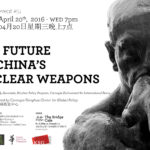 event #51, Wednesday, April 20th, 2016 Speaker ZHAO Tong, 赵通, Associate, Nuclear Policy Program, Carnegie Endowment for International Peace ABSTRACT "China’s nuclear modernization program has attracted wide international attention. The 2015 Victory Day parade saw China displaying new ballistic missile systems. Beijing is also reportedly developing new strategic…
event #51, Wednesday, April 20th, 2016 Speaker ZHAO Tong, 赵通, Associate, Nuclear Policy Program, Carnegie Endowment for International Peace ABSTRACT "China’s nuclear modernization program has attracted wide international attention. The 2015 Victory Day parade saw China displaying new ballistic missile systems. Beijing is also reportedly developing new strategic…
Read more... -
13 Apr
#51 – The Future of China’s Nuclear Weapons
event #51, Wednesday, April 20th, 2016
Speaker
ZHAO Tong, 赵通, Associate, Nuclear Policy Program, Carnegie Endowment for International Peace
ABSTRACT
“China’s nuclear modernization program has attracted wide international attention. The 2015 Victory Day parade saw China displaying new ballistic missile systems. Beijing is also reportedly developing new strategic missile programs and building a strategic nuclear submarine fleet. This presentation offers an overview of China’s nuclear principles and doctrine. It explains how the emergence of nuclear military technologies such as missile defense, conventional precision strike, space, and autonomous weapons presents new challenges for Beijing to maintain a credible nuclear second strike capability. It uses the example of China’s development of sea-based nuclear weapons to shed light on Beijing’s efforts to address such problems and to explain potential security implications for conventional military balance and escalation management. Professor Zhao will be more than happy to address questions and have a broad discussion on other related nuclear policy issues such as North Korea and the possible deployment of THAAD missile defense system in South Korea”.
This event is organized in partnership with:
Carnegie-Tsinghua Center for Global Policy – 清华-卡内基全球政策中心
The Carnegie–Tsinghua Center for Global Policy brings together leading policy experts and practitioners from China and around the world to engage in collaborative dialogue and research. From its platform at Tsinghua University, the center works to identify constructive solutions to common global challenges. The Carnegie–Tsinghua Center is also part of Carnegie’s well-established Asia Program, which provides clear and precise analysis to policy-makers on the economic, security, and political developments in the Asia-Pacific region.The Carnegie–Tsinghua Center works with Carnegie’s other global centers to host conferences, roundtables, seminars, and closed-door briefings and to publish timely and incisive analysis on the most pressing global issues, including international economics and trade; energy and climate change; nonproliferation and arms control; and security threats in North Korea, Iran, South Asia, and the Middle East. An advisory council composed of distinguished leaders from the policy, business, and academic communities in China provides the Carnegie–Tsinghua Center with advice and support.
Related Posts
- 10000
 ZHAO Tong 赵通, Associate, Nuclear Policy Program, Carnegie Endowment for International Peace ZHAO Tong is an associate in Carnegie’s Nuclear Policy Program based at the Carnegie–Tsinghua Center for Global Policy. His research focuses on strategic security issues, including nuclear arms control, nonproliferation, missile defense, strategic stability, and China’s security…
ZHAO Tong 赵通, Associate, Nuclear Policy Program, Carnegie Endowment for International Peace ZHAO Tong is an associate in Carnegie’s Nuclear Policy Program based at the Carnegie–Tsinghua Center for Global Policy. His research focuses on strategic security issues, including nuclear arms control, nonproliferation, missile defense, strategic stability, and China’s security… - 10000April 20th, 2016 The Future of China's Nuclear Weapons Supplementary material Kulacki, Gregory. 2015. The Chinese Military Updates China’s Nuclear Strategy. Union of Concerned Scientists. Available here. Kristensen, Hans M. and Robert S. Norris. 2015. Chinese nuclear forces. Bulletin of the Atomic Scientists, Vol. 71(4) 77–84. Available here.…
- 10000April 20th, 2016 Bridge Cafe (Wudaokou) Speaker: ZHAO Tong, 赵通, Associate, Nuclear Policy Program, Carnegie Endowment for International Peace Presentation Nuclear weapons still represent, today, the most destructive weapons that states could eventually employ during a military confrontation as well as the foundation of a country’s military power. We…
Read more... -
12 Apr
Podcast #50 – Leisinger, Liu
Podcast
Related Posts
- 10000
 event #50, Tuesday, March 22nd, 2016 Speakers Klaus LEISINGER, Professor of Sociology, University of Basel; President, Global Values Alliance; Senior Adviser, Karl Schlecht Foundation. LIU Baocheng 刘宝成, Director of the Center for International Business Ethics at the University of International Business and Economics (UIBE, China). ABSTRACT The “2030 Agenda for Sustainable Development”, adopted…
event #50, Tuesday, March 22nd, 2016 Speakers Klaus LEISINGER, Professor of Sociology, University of Basel; President, Global Values Alliance; Senior Adviser, Karl Schlecht Foundation. LIU Baocheng 刘宝成, Director of the Center for International Business Ethics at the University of International Business and Economics (UIBE, China). ABSTRACT The “2030 Agenda for Sustainable Development”, adopted… - 10000
 March 22nd, 2016 Bridge Cafe (Wudaokou) Speakers: Klaus LEISINGER, Professor of Sociology, University of Basel; President, Global Values Alliance; Senior Adviser, Karl Schlecht Foundation. LIU BAOCHENG, 刘宝成, Director of the Center for International Business Ethics at the University of International Business and Economics (UIBE, China). Presentation In an increasingly interconnected…
March 22nd, 2016 Bridge Cafe (Wudaokou) Speakers: Klaus LEISINGER, Professor of Sociology, University of Basel; President, Global Values Alliance; Senior Adviser, Karl Schlecht Foundation. LIU BAOCHENG, 刘宝成, Director of the Center for International Business Ethics at the University of International Business and Economics (UIBE, China). Presentation In an increasingly interconnected… - 10000
 Klaus LEISINGER , Professor of Sociology, University of Basel; President, Global Values Alliance; Senior Adviser, Karl Schlecht Foundation. Professor Klaus M. Leisinger is a social scientist and economist at the University of Basel. His professional career took him for several years to East Africa as CEO of the former Ciba Pharmaceuticals regional office…
Klaus LEISINGER , Professor of Sociology, University of Basel; President, Global Values Alliance; Senior Adviser, Karl Schlecht Foundation. Professor Klaus M. Leisinger is a social scientist and economist at the University of Basel. His professional career took him for several years to East Africa as CEO of the former Ciba Pharmaceuticals regional office… - 10000
 LIU Baocheng 刘宝成, Director of the Center for International Business Ethics at the University of International Business and Economics (UIBE, China). Professor LIU is the founder and Director of the Center for International Business Ethics (CIBE) at the University of International Business and Economics, Deputy Director of China Open Economy…
LIU Baocheng 刘宝成, Director of the Center for International Business Ethics at the University of International Business and Economics (UIBE, China). Professor LIU is the founder and Director of the Center for International Business Ethics (CIBE) at the University of International Business and Economics, Deputy Director of China Open Economy…
Read more... -
07 Apr
#51 – Reading list
April 20th, 2016
The Future of China’s Nuclear Weapons
Supplementary material
- Kulacki, Gregory. 2015. The Chinese Military Updates China’s Nuclear Strategy. Union of Concerned Scientists. Available here.
- Kristensen, Hans M. and Robert S. Norris. 2015. Chinese nuclear forces. Bulletin of the Atomic Scientists, Vol. 71(4) 77–84. Available here.
- Colby, Elbridge A. and Abraham M. Denmark. 2013. Nuclear Weapons and U.S.-China Relations. Center for Strategic and International Studies. Available here.
Related Posts
- 10000
 event #51, Wednesday, April 20th, 2016 Speaker ZHAO Tong, 赵通, Associate, Nuclear Policy Program, Carnegie Endowment for International Peace ABSTRACT "China’s nuclear modernization program has attracted wide international attention. The 2015 Victory Day parade saw China displaying new ballistic missile systems. Beijing is also reportedly developing new strategic…
event #51, Wednesday, April 20th, 2016 Speaker ZHAO Tong, 赵通, Associate, Nuclear Policy Program, Carnegie Endowment for International Peace ABSTRACT "China’s nuclear modernization program has attracted wide international attention. The 2015 Victory Day parade saw China displaying new ballistic missile systems. Beijing is also reportedly developing new strategic… - 10000
 ZHAO Tong 赵通, Associate, Nuclear Policy Program, Carnegie Endowment for International Peace ZHAO Tong is an associate in Carnegie’s Nuclear Policy Program based at the Carnegie–Tsinghua Center for Global Policy. His research focuses on strategic security issues, including nuclear arms control, nonproliferation, missile defense, strategic stability, and China’s security…
ZHAO Tong 赵通, Associate, Nuclear Policy Program, Carnegie Endowment for International Peace ZHAO Tong is an associate in Carnegie’s Nuclear Policy Program based at the Carnegie–Tsinghua Center for Global Policy. His research focuses on strategic security issues, including nuclear arms control, nonproliferation, missile defense, strategic stability, and China’s security… - 69April 20th, 2016 Bridge Cafe (Wudaokou) Speaker: ZHAO Tong, 赵通, Associate, Nuclear Policy Program, Carnegie Endowment for International Peace Presentation Nuclear weapons still represent, today, the most destructive weapons that states could eventually employ during a military confrontation as well as the foundation of a country’s military power. We…
Read more... -
04 Apr
#50 event report – Sustainable Corporate Development in China and the World
March 22nd, 2016 Bridge Cafe (Wudaokou)
Speakers:
Klaus LEISINGER, Professor of Sociology, University of Basel; President, Global Values Alliance; Senior Adviser, Karl Schlecht Foundation.
LIU BAOCHENG, 刘宝成, Director of the Center for International Business Ethics at the University of International Business and Economics (UIBE, China).
Presentation
In an increasingly interconnected world, decisions about economic, social or economic issues taken in New York, Berlin or Beijing will affect the life and future of people living elsewhere on the planet. Looking for business solutions through an exclusively economic magnifying lens (i.e. cutting costs and increasing profits), without considering the social and environmental consequences of such decisions, has pushed the carrying capacity of the world to the limits. Last year in September 2015 the General Assembly of the United Nations adopted the “2030 Agenda for Sustainable Development”, a “plan of action for people, planet and prosperity” listing seventeen goals that national governments and individual citizens must follow for transforming the world into a more equal, freer and better place to live for today´s and future generations.
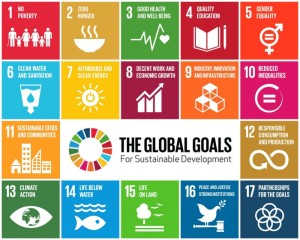
Being directly involved as senior advisor to the United Nations system, among others, for the UN Global Compact, the UN Sustainable Development Solutions network and the Consultative Group on International Agricultural Research, professor Klaus Leisinger joined the 50th talk of ThinkIN China for highlighting the challenges of corporate sustainable responsibility. Professor Liu Baocheng, Director of the Center for International Business Ethics at the University of International Business and Economics of Beijing, shared his views on the same subject from a Chinese perspective.
“What’s the world I want to leave to the next generation?
First of all, for changing the unsustainable “business-as-usual-path” the corporate decision makers of the world are currently following, a new business mindset is needed. The overall issue for business people is a finance and marketing myopia, its equivalent for politicians is a “re-election-myopia”: All important decisions taken today are predominantly subordinated to the sole objective to obtain results in the short-term. Sustainable development requests a different approach, one that does not seem to fit into today´s economic and political syllogism: investing something today for a return on investment that is coming along in 15-20 years and that will affect the life of our descendants and of people living far away from today´s economic and political stakeholders. Only through an inter-generational awareness will a moral obligation of such a kind become perceivable. The hope is that human beings all over the world in all their professional and private roles will increasingly accept responsibility for sustainable development and start to act coherently in their sphere of influence, in a spirit of shared values and shared responsibility.
“There is a price to pay for integrity, but look at it as an investment, and not as an expenditure”
“Business has a pivotal role to play in the 2030 Agenda for Sustainable Development” as UN General Secretariat Ban Ki-moon stated: significant results will only be achievable if and when companies go further than today´s business as usual. They must start to integrate the Sustainable Development Goals (and 169 targets) into business strategies and research strategies and come up with innovative products and services.
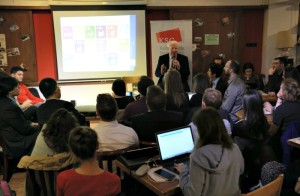
Sustainable development is a complex process and cannot be achieved through a single act – like e.g. end-of-the-pipe environmental protection. Sustainable development thinking must guide the entire management process. Acting with integrity from the top, walking the talk and being an example for all the employees will motivate and commit employees and suppliers to sustainable corporate policies. To measure progress made, different performance indicators, different targets and new incentive structures are in need: If top management gives credit and rewards only those who bring in more turnover and less costs there is not much of an incentive to focus on environmental costs or social disparities, i.e. the system won’t change.
Communication is key
Companies are always willing to report on their successes and to give the impression that they are “the best”, “outstanding”, “excellent”. They shy away to report about unsolved problems, set-backs, obstacles and dilemmas. But then: Only through an open and transparent communication about the whole picture, communication where different stakeholders can actively participate and all actors involved can share different knowledge, skills, experiences and resources that benefits the entire system – only through such a communication can society as a whole go jointly on a learning curve. The business world, civil society, academia and governments must all be involved in shaping sustainability.
China’s role
China’s corporate history is very short: the first Chinese corporate law dates back only to 1984. The burdens of the planned economy, where companies were not entitled to make independent decisions and to act according to the market, left China today with a huge gap to fill in corporate behavior. Of the sixty million companies registered in China, only 3.4% are State Owned Enterprises, but they still control 47% of total assets. In the last few decades, hundred of thousands of foreign companies relocated in China, attracted by cheap and abundant labor force and lower environmental and social standards, transformed China into the “world factory”. The economic success and the creation of hundreds of millions of new, productive jobs are known – but so are the costs and damages caused by this phenomenon.
As China becomes more interconnected with the world, rising as the second biggest economy, it has, as Professor Liu explained, to learn new rules and start to respect higher standards. In professor Liu’s words, China is willing to bear more responsibilities. However, it still needs to reach two main goals: an efficient market and an effective government, from the highest level of the leadership down to local officials. The bureaucratic machine must be re-dimensioned, reducing expenditures and easing up procedures. Economy itself will have to move from a nearly exclusively export-led model to a predominantly consumption one. But then this cannot be achieved in the short term, as Chinese people will maintain high saving rates as long as social welfare won’t be strengthened. Education is key in this transformation: investing on the talents of tomorrow as well as sharing sustainable development values such as non-violence and respect for life, solidarity and just economic order, tolerance and truthfulness, equal rights and mutual esteem. This will provide China – and the world – with new brand of businessmen and -women, officials and scientists aware that every decision and action has a sustainability dimension.
The question is no longer “will things change?” if and when we continue with business as usual. The only really important question is: we will be able to influence the rate and structure of change or we will wait until confronted with catastrophes and crises that impose emergency action without any degree of freedom?
Today we still have the choice: the earliest we start, the more we can do and the less expensive it will be in economic, social and political costs.
Written by Martina Poletti
Related Posts
- 10000
 event #50, Tuesday, March 22nd, 2016 Speakers Klaus LEISINGER, Professor of Sociology, University of Basel; President, Global Values Alliance; Senior Adviser, Karl Schlecht Foundation. LIU Baocheng 刘宝成, Director of the Center for International Business Ethics at the University of International Business and Economics (UIBE, China). ABSTRACT The “2030 Agenda for Sustainable Development”, adopted…
event #50, Tuesday, March 22nd, 2016 Speakers Klaus LEISINGER, Professor of Sociology, University of Basel; President, Global Values Alliance; Senior Adviser, Karl Schlecht Foundation. LIU Baocheng 刘宝成, Director of the Center for International Business Ethics at the University of International Business and Economics (UIBE, China). ABSTRACT The “2030 Agenda for Sustainable Development”, adopted… - 10000
 Klaus LEISINGER , Professor of Sociology, University of Basel; President, Global Values Alliance; Senior Adviser, Karl Schlecht Foundation. Professor Klaus M. Leisinger is a social scientist and economist at the University of Basel. His professional career took him for several years to East Africa as CEO of the former Ciba Pharmaceuticals regional office…
Klaus LEISINGER , Professor of Sociology, University of Basel; President, Global Values Alliance; Senior Adviser, Karl Schlecht Foundation. Professor Klaus M. Leisinger is a social scientist and economist at the University of Basel. His professional career took him for several years to East Africa as CEO of the former Ciba Pharmaceuticals regional office… - 10000
 LIU Baocheng 刘宝成, Director of the Center for International Business Ethics at the University of International Business and Economics (UIBE, China). Professor LIU is the founder and Director of the Center for International Business Ethics (CIBE) at the University of International Business and Economics, Deputy Director of China Open Economy…
LIU Baocheng 刘宝成, Director of the Center for International Business Ethics at the University of International Business and Economics (UIBE, China). Professor LIU is the founder and Director of the Center for International Business Ethics (CIBE) at the University of International Business and Economics, Deputy Director of China Open Economy…
Read more... -
11 Mar
Klaus LEISINGER
Klaus LEISINGER , Professor of Sociology, University of Basel; President, Global Values Alliance; Senior Adviser, Karl Schlecht Foundation.
Professor Klaus M. Leisinger is a social scientist and economist at the University of Basel. His professional career took him for several years to East Africa as CEO of the former Ciba Pharmaceuticals regional office and he was Managing Director and Chairman of the Board of Trustees of the Novartis Foundation until 2013. He is engaged in corporate responsibility issues and actively promotes a corporate culture of dialogue with stakeholders in international policy, development cooperation and business ethics. He held numerous advisory positions in organizations such as the UN Global Compact, the United Nations Development Program (UNDP), the World Bank, the World Economic Forum (Global Agenda on Human Rights) and the Karl Schlecht Foundation.
Related Posts
- 10000
 event #50, Tuesday, March 22nd, 2016 Speakers Klaus LEISINGER, Professor of Sociology, University of Basel; President, Global Values Alliance; Senior Adviser, Karl Schlecht Foundation. LIU Baocheng 刘宝成, Director of the Center for International Business Ethics at the University of International Business and Economics (UIBE, China). ABSTRACT The “2030 Agenda for Sustainable Development”, adopted…
event #50, Tuesday, March 22nd, 2016 Speakers Klaus LEISINGER, Professor of Sociology, University of Basel; President, Global Values Alliance; Senior Adviser, Karl Schlecht Foundation. LIU Baocheng 刘宝成, Director of the Center for International Business Ethics at the University of International Business and Economics (UIBE, China). ABSTRACT The “2030 Agenda for Sustainable Development”, adopted…
Read more... -
11 Mar
LIU Baocheng
LIU Baocheng 刘宝成, Director of the Center for International Business Ethics at the University of International Business and Economics (UIBE, China).
Professor LIU is the founder and Director of the Center for International Business Ethics (CIBE) at the University of International Business and Economics, Deputy Director of China Open Economy Institute, founder of the Sino-America International Management Institute, and Director of the Sino-French Excellence Institute.
Furthermore, Dr. Liu established China’s first Masters Program on Sustainable Development at China Agriculture University in partnership with the University Paris Dauphine (MSD). He served as adjunct professor at Seton Hall University, Montclair State University, and University of Maryland.
Dr. Liu also serves on the council for China’s Society of Economic Transitions and Research Center of Multinational Corporations. He is also a member of the Advisory Council to the Beijing Foreign Investment Administration and to Shizuishan City of Ningxia Autonomous Region.
Related Posts
- 10000
 event #50, Tuesday, March 22nd, 2016 Speakers Klaus LEISINGER, Professor of Sociology, University of Basel; President, Global Values Alliance; Senior Adviser, Karl Schlecht Foundation. LIU Baocheng 刘宝成, Director of the Center for International Business Ethics at the University of International Business and Economics (UIBE, China). ABSTRACT The “2030 Agenda for Sustainable Development”, adopted…
event #50, Tuesday, March 22nd, 2016 Speakers Klaus LEISINGER, Professor of Sociology, University of Basel; President, Global Values Alliance; Senior Adviser, Karl Schlecht Foundation. LIU Baocheng 刘宝成, Director of the Center for International Business Ethics at the University of International Business and Economics (UIBE, China). ABSTRACT The “2030 Agenda for Sustainable Development”, adopted…
Read more... -
11 Mar
#50 – Sustainable Corporate Development in China and the World
event #50, Tuesday, March 22nd, 2016
Speakers
Klaus LEISINGER, Professor of Sociology, University of Basel; President, Global Values Alliance; Senior Adviser, Karl Schlecht Foundation.
LIU Baocheng 刘宝成, Director of the Center for International Business Ethics at the University of International Business and Economics (UIBE, China).
ABSTRACT
The “2030 Agenda for Sustainable Development”, adopted by the international community in 2015, is a plan of action for people, planet and prosperity. It seeks to strengthen universal peace in larger freedom. Eradicating poverty is the greatest global challenge and an indispensable requirement for sustainable development. All countries and all citizens, including corporate citizens, acting in collaborative partnership, will implement this plan. Bold and transformative steps that are urgently needed to shift the world onto a sustainable and resilient path.
Due to the complexity and dimensions of our global development challenges, more than ever before, successful sustainability endeavors depend on multi-stakeholder partnerships that “mobilize and share knowledge, expertise, technology and financial resources, to support the achievement of the sustainable development goals in all countries, in particular developing countries”. Corporations – the single most efficient source of economic activity and innovation – ought to play a leadership role in this particular kind of values management. To effectively do so, the values management terms compliance and integrity, have to be defined in a broader manner and a third term, compassion, usually not part of corporate language and work streams, will have to be included.
Corporate Sustainability Management along these lines could be interpreted as introducing care, responsibility, respect and knowledge as a leadership component for sustainable business success.
In the case of China’s corporate world, although consensus has been reached over the general notion of sustainable development, companies continue to retain vastly disarrayed agenda and priorities. At the macro level, the urge to retain GDP growth rate, accelerated drive toward nationwide industrialization and urbanization, endowment curse of energy structure, as well as local protectionism, all of these elements present looming challenges against environmentally friendly behavior. At the corporate level, high variation in ownership structure, corporate size, governance and location also lead to different compliance and social impact.
Join ThinkIN China for the grand opening of our activities in 2016 and for celebrating with all of us the outstanding result of organizing our 50th event!
Related Posts
- 10000
 March 22nd, 2016 Bridge Cafe (Wudaokou) Speakers: Klaus LEISINGER, Professor of Sociology, University of Basel; President, Global Values Alliance; Senior Adviser, Karl Schlecht Foundation. LIU BAOCHENG, 刘宝成, Director of the Center for International Business Ethics at the University of International Business and Economics (UIBE, China). Presentation In an increasingly interconnected…
March 22nd, 2016 Bridge Cafe (Wudaokou) Speakers: Klaus LEISINGER, Professor of Sociology, University of Basel; President, Global Values Alliance; Senior Adviser, Karl Schlecht Foundation. LIU BAOCHENG, 刘宝成, Director of the Center for International Business Ethics at the University of International Business and Economics (UIBE, China). Presentation In an increasingly interconnected… - 10000
 Klaus LEISINGER , Professor of Sociology, University of Basel; President, Global Values Alliance; Senior Adviser, Karl Schlecht Foundation. Professor Klaus M. Leisinger is a social scientist and economist at the University of Basel. His professional career took him for several years to East Africa as CEO of the former Ciba Pharmaceuticals regional office…
Klaus LEISINGER , Professor of Sociology, University of Basel; President, Global Values Alliance; Senior Adviser, Karl Schlecht Foundation. Professor Klaus M. Leisinger is a social scientist and economist at the University of Basel. His professional career took him for several years to East Africa as CEO of the former Ciba Pharmaceuticals regional office… - 10000
 LIU Baocheng 刘宝成, Director of the Center for International Business Ethics at the University of International Business and Economics (UIBE, China). Professor LIU is the founder and Director of the Center for International Business Ethics (CIBE) at the University of International Business and Economics, Deputy Director of China Open Economy…
LIU Baocheng 刘宝成, Director of the Center for International Business Ethics at the University of International Business and Economics (UIBE, China). Professor LIU is the founder and Director of the Center for International Business Ethics (CIBE) at the University of International Business and Economics, Deputy Director of China Open Economy…
Read more... -
21 Jan
Fall Season 2015
#49 – China’s Contribution to the Global Governance of Climate Change
#48 – Governing the Socialist Market: Developmentalism and China
#47 – Innovative China: Alibaba’s Rural Strategy and its International Implication
#46 – The (un)bearable Lightness of Finance: Stock Market Volatility in China
Read more... -
21 Jan
#49 event report – China’s Contribution to the Global Governance of Climate Change
December 17th, 2015 Bridge Cafe (Wudaokou)
Speaker:
Paolo D. FARAH – Professor of Public Administration, West Virginia University; Director of Research at gLAWcal – Global Law Initiative for Sustainable Development
DENG Haifeng, 邓海峰, Associate Professor, Tsinghua University, School of Law
Presentation
China has long been dominating global energy markets as the world’s largest producer, consumer, and net importer of energy. Its fierce year-to-year economic growth relies on a voracious energy appetite; but China now faces the daunting task of maintaining staggeringly high levels of economic development while tackling issues of domestic and global environmental degradation. In light of its commitment to the global fight against climate change, China under Xi Jinping has vowed to play a more constructive role through the implementation of environmental law reforms.
The issuing of a draft Environmental Protection Tax Law in June 2015 drew much attention, as it leaves room for the future introduction of a nationwide carbon tax system in China. Beijing has pledged to reduce its carbon intensity by 17% between 2011 and 2015, compelling its most energy intensive industries to cut carbon produced per unit of output by over 20%. If a tax on carbon emissions was effectively introduced, it would be roughly equivalent to 10 RMB per tonne of CO2. The Draft Law in question is indicative of the Central Government’s commitment to the realization of previously issued environmental pledges. In spite of the growing optimism among those observing China’s carbon tax revolution, however, a series of challenges may still lie ahead of the CPC’s plans for China’s greener growth.
ThinkIN China hosted a discussion with Prof. Paolo D. Farah and Prof. Deng Haifeng, providing its audience with a unique opportunity to reflect on the issues that the PRC currently faces in the implementation of a nationwide carbon tax system.
First of all, panelists observed that adding a carbon tax to the current PRC environmental taxation system could harm the interests of average consumers. The upcoming introduction of a carbon tax may thus require the abolishment of other taxes, such as those already applied to fuel, oil, and transportation.
Secondly, panelists noted that a carbon tax system could only be made efficient through the successful merging of the Ministry of Finance, the Ministry of Environmental Protection, and the State Administration for Taxation. The taxation authority of the PRC is currently fragmented among these three organisms. Once combined, these governmental bodies will need to be tasked to coordinate the PRC’s taxation system together, integrating their various components in one overarching body. A number of government programs, however, may be kept running, such as the verification of greenhouse gas emissions (traditionally overseen by the Ministry of Environmental Protection).
Lastly, participants concluded that striking the right balance between the introduction of a carbon tax and the management of a nationwide cap-and-trade system (scheduled to be implemented from 2017 onwards) is one of the most daunting challenges that lie ahead for Central Authorities. As both systems have very different functions, failure to balance them might greatly harm the PRC’s industrial sector.
After having examined China’s most pressing challenges, Professor Farah elaborated on the concept of “fragmentation of authority”. He regards it as a phenomenon that doesn’t affect the Environmental Protection Law sector alone, instead characterizing a variety of other departments within the PRC. High fragmentation of authority generally calls for legal reform, and should be solved by merging separate governmental bodies entrusted with similar responsibilities.
As already mentioned, if the current carbon tax draft law was to come into effect, a similar reform scheme would be applied to the Ministry of Finance, the Ministry of Environmental Protection, and the State Administration for Taxation. The solution to most of the challenges currently faced by Central Authorities may thus lie in the transparent implementation of legal reform initiatives. These, Farah argued, have become all the more crucial with China’s accession to the WTO – an event which blurred the boundaries between Chinese domestic and foreign policy, and called for the PRC’s adoption of more transparent trade measures. Being granted access to the WTO means for China that its domestic policy decisions have the potential to affect international relations and international treaties, and not just the Chinese legal system.
Further, with the introduction of a carbon tax in China, issues of climate change will become more closely related to a trade dimension. In this scenario, even greater levels of transparency will be required to avoid the emergence of misunderstandings between China and its partners abroad. Foreign actors wishing to develop within China, for instance, will have to be treated by the same standards that are applied to Chinese companies.
Q&A:
The introduction of a carbon tax in China may negatively affect the lives of average consumers. If the costs of carbon emissions were transmitted down the prices of consumer goods, the carbon tax system would indirectly widen the divide between wealthier and poorer consumers within China, fostering a model of “unequal development”. Elaborating in more detail on the implications of the system for Chinese society, Prof. Farah highlighted the difficulties that countries worldwide face with regards to trying to foster more equal modes of development. “All countries, both developing and developed, have to address social inequality, which cannot be regarded as an issue of China alone”, Farah added. To address the issue in the short term, the introduction of a tax on carbon will need to be complemented with the elimination of already existing taxes, namely those applied to either oil, or fuel, or transportation. In the medium-to-long term, however, China will need to make concreted efforts towards diminishing overall energy demands, at the same time embracing a growth model that values “economic balance” over “ever-growing development”.
Panelists also agreed that the international community might be particularly enthusiastic about the recent publication of China’s draft law on carbon taxation; yet, the real challenge for China will concern the actual top-down implementation of the law itself, combined with a substantial decrease in the bottom-up demand for energy. Prof. Farah also noted: “the Central Government can’t achieve the goals it has set for itself without the participation of civil society and the involvement of middle institutions at the provincial and municipal level”.
written by Carlotta Clivio
Related Posts
- 10000
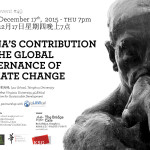 event #49, Thursday, December 17th, 2015 Speakers DENG Haifeng, 邓海峰, Law School, Tsinghua University Paolo Davide FARAH, West Virginia University, gLAWcal - Global Law Initiative for Sustainable Development ABSTRACT As global climate change and its adverse effects have caused serious consequences, the Chinese Government is speeding up on energy saving and emission reductions, becoming much more active on the climate and environment front. According to…
event #49, Thursday, December 17th, 2015 Speakers DENG Haifeng, 邓海峰, Law School, Tsinghua University Paolo Davide FARAH, West Virginia University, gLAWcal - Global Law Initiative for Sustainable Development ABSTRACT As global climate change and its adverse effects have caused serious consequences, the Chinese Government is speeding up on energy saving and emission reductions, becoming much more active on the climate and environment front. According to… - 10000
 Paolo Davide Farah, West Virginia University (USA), gLAWcal (UK) & EPSEI EU Commission Research Project Professor Paolo Davide Farah (PhD, PhD, LL.M, J.D.) works at West Virginia University (WV, USA) where he teaches climate change, energy and environmental law and policy. Prof. Farah has previously taught public international law,…
Paolo Davide Farah, West Virginia University (USA), gLAWcal (UK) & EPSEI EU Commission Research Project Professor Paolo Davide Farah (PhD, PhD, LL.M, J.D.) works at West Virginia University (WV, USA) where he teaches climate change, energy and environmental law and policy. Prof. Farah has previously taught public international law,… - 10000
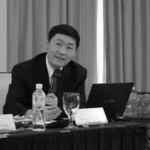 DENG Haifeng 邓海峰, Associate Professor of Law School, Tsinghua University; Assistant Dean and Vice Director of the Center for Environmental, Natural Resources & Energy Law at Tsinghua University. Professor DENG's research focuses on environmental law, nature resource law and energy law. He has been an official expert and consultant…
DENG Haifeng 邓海峰, Associate Professor of Law School, Tsinghua University; Assistant Dean and Vice Director of the Center for Environmental, Natural Resources & Energy Law at Tsinghua University. Professor DENG's research focuses on environmental law, nature resource law and energy law. He has been an official expert and consultant…
Read more... -
10 Dec
#48 event report – Governing the Socialist Market
November 9th, 2015 Bridge Cafe (Wudaokou)
Speaker:
Robert WADE, Professor of Political Economy and Development, London School of Economics
Shaun BRESLIN, Professor of Politics and International Studies, University of Warwick
WANG Zhengyi, 王正毅, Professor of International Political Economy, Peking University
Giuseppe GABUSI, Professor of International Political Economy and Political Economy of East Asia, University of Torino
Presentation
ThinkIN China, the leading community of young China experts at the academic heartland of China – the triangle of Tsinghua, Beida and Renmin in Beijing – hosted three atypical European and Chinese intellectuals to discuss a core catchphrase of CPC’s ideological code: “The Socialist Market”. Seen by many as an oxymoron or a product of dialectic materialism, the term “Socialist Market” (社会主义市场经济) has since its invention in the early 80s defined the operational code of Chinese officials from small town mayors to county and provincial governors, up to the very source of power in the imperial palaces of Beijing and the politburo of the CPC. Torino University professor Giuseppe Gabusi moderated the discussion.
The date of the event could not have been more symbolic as 2015 marks the 25th anniversary of Robert Wade’s seminal and groundbreaking book “Governing the Market” which is now considered a classic, setting the intellectual foundations to the concept of the “Asian developmental state” and the new political economy.
The ThinkIN China event provided a unique opportunity to reflect on consequential issues for the evolution of political economy after taking into consideration new “known knowns”; that is, new historical inputs in the course of the past 20 years since Wade’s book. These include: the “.com” crisis of the late 90s, the meltdown of Wall Street and the great recession in 2008, the crisis in the Eurozone and the meteoric economic rise of China. Particularly the latter, the rise of China, has re-inspired a heated discussion on the “Developmental State” as a pragmatic alternative to the laissez-faire imperative of the Washington Consensus.
Wade: two faces of Emerging Economies:
Commodity Dependent Economies
It is by now well understood that at the dawn of the new millennium many emerging market economies began to grow strongly thus narrowing their economic gap with the developed world. To many myopic observers of the 2000 age of “Asiaphoria”, economic convergence would sooner or later lead to a more homogeneous and isomorphic world.
Yet while on the surface emerging economies grew fast, the quality of their growth has been very diverse. Some grew by exporting commodities, while others grew by exporting increasingly complex industrial or even technology intensive products. Many countries, particularly in Africa and Latin America, became increasingly specialized in exporting commodities to China whereas China became an industrial superpower narrowing its gap with Europe and the United States.
Much of the developing world thus run a commodity export dependent economy prone to exogenous demand crisis. When Wall Street came crushing down in 2008 unleashing the “Great Recession”, the developing countries began to slow down as well. This trend has now been exacerbated as China has also slowed down to single digit growth, limiting its imports of basic commodities. The collapse of world price and demand for commodities has lead to a negative feedback loop for many emerging economies and Brazil is expected to contract by more than 3% this year. After all, Citigroup supports that Chinese growth is closer to 4% rather than 6%, which is the official estimate and if Citigroup is correct the developing word will experience a prolonged economic shock and need to receive increased developmental funding to survive.
While China has slowed down, still though, if one takes as a measure the number of years that a country grows more than 6% a year then China has broken the record growing over 6% for 38 year, Taiwan grew for 32 years, South Korea for 29 years.
China an industrial superpower prone to a middle-income trap?
In China there is also a serious worry in elite governing circles that China will grow old before growing rich as it could fall into the “middle income trap”. According to a widely circulated World Bank study on middle income trap, out of 101 middle income countries in 1960, only 13 have gone up to develop high income economies. The chances of a middle-income country to become high income are low even within a time horizon spanning several decades.
China’s aggregate economic power has blinded analysts. While the middle kingdom is the second largest economy (in nominal GDP terms), it only ranks 90th in the world in terms of Human Development Index (HDI). For the past 10 years there has been a lot of discussion on the repercussions of the meteoric rise of China for the world economic system. However, on absolute indicators of development China remains at about 20 to 30% the level of US. “Asiaphoria” is an unfounded optimism about the Global Economic Center of Gravity shifting to Asia.
China’s Industrial Governmentalism
Economic development is a long-term complex process that requires both the invisible hand of individual entrepreneurship and the very visible hand of governmental strategic economic management. In the West, however, there is a prevalent all powerful orthodoxy that development is based on a one-size-fits-all model; a panacea prescribed by the World Bank and IMF that supports privatization, and other types of unabated liberalization solely supported by the invisible hand of the market. This market fundamentalism coupled with very limited state programs to reduce extreme poverty and corruption secure long-term sustainable growth, technocrats adhering to the liberal orthodoxy boldly declare.
Studying the economic history of countries that have broken away from the middle-income trap, two empirically evident scenarios are however crystal clear. Some of the countries have escaped the trap because of abundant natural resources, others have escaped by “manufacturing or industrializing their way out”. In that case the role of the state has been prominent: strategically managing trade, industry and the very pace of liberalization the government has become the ultimate catalyst in taking those countries out of the middle-income trap.
Yet in the “development industry of the Washington Consensus” industrial policy has been a forbidden term inspiring an intellectual casus belli. This is fully confirmed in the case of Justin Yifu Lin who in 2007 became the first Chinese to reach the position of World Bank’s Chief Economist. Lin tried to shift the Washington Consensus to the idea of production transformation mainly expressed through a special form of state induced industrial policy. That term was immediately forbidden from official World Bank rhetoric and Lin was eventually marginalized. According to his own statement more than 90% of World Bank economists disagreed with his policy suggestions, arguing instead that, “for every Korea there are 100 cases of failure so where would you put your money on?” Only one operational World Bank vice president made an attempt to apply Lin’s industrial policies. This program was called the “Competitive Partnership Initiative”.
The other case is the one of the United Nations Industrial Development Organization (UNIDO). UNIDO exists to help promote industrialization in the developing world – an imperative that Western countries oppose as they want Third World countries to be dependent commodity exporters. For that reason many western countries have withdrawn from UNIDO. Seeking to boost UNIDO’s influence, developing countries asked China to lead the organization. The members achieved to pass the sustainable development goal number 9 which is a goal of industrialization while Western advanced economies went to great lengths to remove goal no. 9 from the sustainable development goals.
China has the unprecedented potential to institutionalize and reformulate the idea of development and include industrial transformation as the core theme of development. China is trying to shift the gravity of thinking within the World Bank, yet its power there is limited. The Asian Infrastructure and Investment Bank (AIIB) should be seen under this prism as it offers China space to set up its own imperatives without being marginalized by the United States. And also the new BRICS Bank and contagion arrangement mechanism, that Asian nations with the leadership of China have already institutionalized, should also be viewed under the same prism of higher Chinese policy freedom to redefine developmental strategy and industrialization.
Overall, while there seems to be an alignment between China and the developing world, this is not yet comprehensive and final. It is more possible that the world is moving to a fragmented rather than multipolar interstate system, as alliances will be narrow and topic specific instead of comprehensive and south-south. There seems to be a complex set of relationships increasing the entropy of the global system and leading more toward networks of power rather than axis of power. Think for instance the proliferation of diverse interests between G20 states. For the G7 the correlation between per capita income and world ranking of G7 members based on aggregate GDP is 0.75. At G20 the correlation is down to 0.3. It is self evident by mere numbers that there is a much higher diversity of interests between G20 members than between G7 members. This creates asymmetries for policies thus grounds for dispute. And this is very relevant for China because it will host the 2016 G20 and has a big puzzle on how to make the G20 more effective and reconcile so diverse interests. This will be perhaps the very first chance to test China’s Strive for Achievement foreign policy reform and exercise leadership in calibrating global governance.
Wang : Socialist Market with Chinese Characteristics
Why do people come to China these days? The pursuit of wealth seems as an attractive answer. It is indisputable that in the past three decades China has progressed economically and the concept of “Socialist Market” has significantly contributed to the economic development of China and to the raise of more than 700 million people out of poverty.
The intellectual history of the idea of socialist market is important to understand the term. First China introduced market economy from the capitalist world through the open door plan. From 1992 till today, in reality, China can be defined as a market socialist economy and this should not be seen a peculiar distinction from Chinese Marxist ideology. Different civilizations institutionalize different market models reflecting their own normative understanding of economic and social structures. Even within the European civilization one can find significant differences between Britain, France, Germany and Scandinavia, let alone the gap between EU welfare state and the United States liberal capitalism. In many statements in US, presidential candidates call the EU a socialist state that should not serve as a model for the United States while in the EU many see US market Darwinism as a disastrous social model.
The grand goal of Chinese socialist market is Social Justice and Harmony and its operational application is based on: a) Hierarchical Vertical management, b) Competition of the 31 local governments with each other. Even at the same province different cities compete with each other: a competition of all against all to attract resources, investments and also political power. The governors of areas that have achieved high growth and innovation stand better chances to be promoted at central governmental posts in Beijing.
To be sure the Socialist Market economy is a new culture; perhaps a Chinese socio-economic innovation that has never existed before in the world. This new culture regulates the behavior of both the individual actors and the state; it shapes social and governing norms, civic and political conduct. Societal harmony can only flourish if there is a shared value that inspires both the hearts and minds of individuals and also regulates the overarching authority of the State.
Breslin: China’s Story is a story of Market Success
In 1980s many visionary young Europeans came to China hoping that they would see a different model of socialism from the one in the Soviet Union. Some were inspired with what they found; the majority, however, was disappointed and left soon after.
It is indisputable that China’s success story is a story of market success. It is the private sector and the invisible hand that have enriched the middle class of the country. China is a market economy but not a liberal one, as the United States or Western Europe. Thus the state still enjoys significant influence, particularly in strategic sectors, and acts as the ultimate arbitrator over resources and strategic design. The state controls the commanding heights of the economy through which it can shape the direction of the market. In addition, the financial system complements state sector’s initiatives providing essential funding and acting as a catalyst to central planning.
The Chinese state controls prices in crucial sectors and it has created a very complex system of SOEs. The most interesting case is that of pyramid companies; that is, of seemingly private enterprises that look like private on the surface, yet they are eventually owned by SOEs. Lately the SOE reform document makes a contradictory call. On the one hand it calls to reform SOEs and turn them into market actors while at the same time it asks for the control of the soul of the organizations and strength the power of the party.
The question of China’s economy is also a question relevant to China’s power. Power as it is widely accepted can be broken down in two categories: soft and hard power. Soft power includes productive power, material power, financial power. The latter is something that China is gaining fast. But there is also a third one, imagined power or marketing power; it is about how other actors perceive you. If China is perceived as an all mighty entity and then states design policies to deal with such an image of China, then it becomes a self-fulfilling prophecy and China will after all become all mighty transitioning from a mighty phantom to a true physical behemoth. Finally, there is also an interesting concept of power that Suzan Strange calls Structural Power. Structural power is about being able to shape the way that others interact not with you but with each other. And I think this is something that people are scared of in the sense of Martin Jacques idea on how China will rule the world. How will China behave? A case study to test this latter dimension of Chinese power could be the newly led Chinese institutional initiatives with the AIIB and the BRICS bank.
written by Vasilis Trigkas
Related Posts
- 10000
 Robert WADE, Professor of Political Economy and Development, London School of Economics Shaun BRESLIN, Professor of Politics and International Studies, University of Warwick WANG Zhengyi, 王正毅, Professor of International Political Economy, Peking University Giuseppe GABUSI, Professor of International Political Economy and Political Economy of East Asia, University of Torino…
Robert WADE, Professor of Political Economy and Development, London School of Economics Shaun BRESLIN, Professor of Politics and International Studies, University of Warwick WANG Zhengyi, 王正毅, Professor of International Political Economy, Peking University Giuseppe GABUSI, Professor of International Political Economy and Political Economy of East Asia, University of Torino… - 10000
 event #48, Monday, November 9th, 2015 Speakers Robert WADE, Professor of Political Economy and Development, London School of Economics Shaun BRESLIN, Professor of Politics and International Studies, University of Warwick WANG Zhengyi, 王正毅, Professor of International Political Economy, Peking University Giuseppe GABUSI, Professor of International Political Economy and Political Economy of…
event #48, Monday, November 9th, 2015 Speakers Robert WADE, Professor of Political Economy and Development, London School of Economics Shaun BRESLIN, Professor of Politics and International Studies, University of Warwick WANG Zhengyi, 王正毅, Professor of International Political Economy, Peking University Giuseppe GABUSI, Professor of International Political Economy and Political Economy of… - 10000November 9th, 2015 Governing the socialist market: developmentalism and China. Supplementary materials Wade, Robert Hunter. 2010. After the Crisis: Industrial Policy and the Developmental State n Low-Income Countries, Global Policy, 1(2), 150-161. Wade, Robert Hunter. 2011. Why Justin Lin's Door-Opening Argument Matters for Development Economics: a Response to "Six…
Read more... -
10 Dec
DENG Haifeng
DENG Haifeng 邓海峰, Associate Professor of Law School, Tsinghua University; Assistant Dean and Vice Director of the Center for Environmental, Natural Resources & Energy Law at Tsinghua University.
Professor DENG’s research focuses on environmental law, nature resource law and energy law. He has been an official expert and consultant for several legislation draftings on environmental protection and sustainable development such as the revision on the Environmental Protection Act of China; the Prevention and Control of Environmental Pollution by Solid Waste of China; the Circular Economy Promotion Act; the Water Pollution Control Act of China; the revision on the Atmospheric Dyeing Prevention Act.
Professor Deng Haifeng is a Visiting Scholar (2014-2015) at gLAWcal – Global Law Initiatives for Sustainable Development.
Related Posts
- 10000
 event #49, Thursday, December 17th, 2015 Speakers DENG Haifeng, 邓海峰, Law School, Tsinghua University Paolo Davide FARAH, West Virginia University, gLAWcal - Global Law Initiative for Sustainable Development ABSTRACT As global climate change and its adverse effects have caused serious consequences, the Chinese Government is speeding up on energy saving and emission reductions, becoming much more active on the climate and environment front. According to…
event #49, Thursday, December 17th, 2015 Speakers DENG Haifeng, 邓海峰, Law School, Tsinghua University Paolo Davide FARAH, West Virginia University, gLAWcal - Global Law Initiative for Sustainable Development ABSTRACT As global climate change and its adverse effects have caused serious consequences, the Chinese Government is speeding up on energy saving and emission reductions, becoming much more active on the climate and environment front. According to…
Read more... -
10 Dec
#49 – China’s contribution to the global governance of climate change
event #49, Thursday, December 17th, 2015
Speakers
DENG Haifeng, 邓海峰, Law School, Tsinghua University
Paolo Davide FARAH, West Virginia University, gLAWcal – Global Law Initiative for Sustainable Development
ABSTRACT
As global climate change and its adverse effects have caused serious consequences, the Chinese Government is speeding up on energy saving and emission reductions, becoming much more active on the climate and environment front. According to the work schedule of the Ministry of Finance, construction of the environmental protection tax system is one essential part of the forthcoming green tax reform in China. On the 10th June 2015, the Cabinet’s Legislative Affairs Office issued a Draft of Environmental Protection Tax Law of the People’s Republic of China (hereinafter referred by the ‘Draft EPT Law’) for soliciting opinions and comments. This action received high attention and caused discussion both at home and abroad. The Draft EPT Law shows the trend of transforming pollution charges into tax, and starts a green reform in administrative management by means of financial tools. Though the law does not include carbon dioxide with taxable pollutants, it leaves space for future carbon taxation. With the increase of green reform in the future, carbon tax will no doubt be put on the priority list of the Chinese Government, at which point the Government will face three major challenges. Firstly, the current unsatisfactory tax system environment will jeopardize carbon tax. It is necessary to repeal the overlaps between the Draft EPT Law and carbon tax, other energy taxes and non-environmental taxes, and introduce carbon tax into the current tax system without throwing off the order of the overall tax structure. Secondly, in spite of the design of the new tax structure, the administrative organization of tax management remains a very critical problem. It will be necessary to establish an orderly interactive relationship horizontally between the environmental agency and tax agency, and vertically between the central and the local authorities. Thirdly, a new carbon tax will cause economic slowdown in the short term. In addition to offering tax rebates, reductions and subsidies, a system of penalties could offset negative effects and optimize positive outcomes of emission reduction.
This event is organized in partnership with:
gLAWcal (Global Law Initiative for Sustainable Development)
gLAWcal is an independent non-profit research organization (think tank) that aims at providing a new focus on issues related to economic law, globalization and development, namely the relationship between international economy and trade, with special attention to a number of non-trade-related values and concerns. Through research and policy analysis, gLAWcal sheds a new light on issues such as good governance, human rights, right to water, rights to food, social, economic and cultural rights, labour rights, access to knowledge, public health, social welfare, consumer interests and animal welfare, climate change, energy, environmental protection and sustainable development, product safety, food safety and security. gLAWcal is a sponsor of ThinkIN China.
Related Posts
- 10000
 DENG Haifeng 邓海峰, Associate Professor of Law School, Tsinghua University; Assistant Dean and Vice Director of the Center for Environmental, Natural Resources & Energy Law at Tsinghua University. Professor DENG's research focuses on environmental law, nature resource law and energy law. He has been an official expert and consultant…
DENG Haifeng 邓海峰, Associate Professor of Law School, Tsinghua University; Assistant Dean and Vice Director of the Center for Environmental, Natural Resources & Energy Law at Tsinghua University. Professor DENG's research focuses on environmental law, nature resource law and energy law. He has been an official expert and consultant… - 10000
 Paolo Davide Farah, West Virginia University (USA), gLAWcal (UK) & EPSEI EU Commission Research Project Professor Paolo Davide Farah (PhD, PhD, LL.M, J.D.) works at West Virginia University (WV, USA) where he teaches climate change, energy and environmental law and policy. Prof. Farah has previously taught public international law,…
Paolo Davide Farah, West Virginia University (USA), gLAWcal (UK) & EPSEI EU Commission Research Project Professor Paolo Davide Farah (PhD, PhD, LL.M, J.D.) works at West Virginia University (WV, USA) where he teaches climate change, energy and environmental law and policy. Prof. Farah has previously taught public international law,… - 62
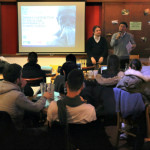 December 17th, 2015 Bridge Cafe (Wudaokou) Speaker: Paolo D. FARAH - Professor of Public Administration, West Virginia University; Director of Research at gLAWcal - Global Law Initiative for Sustainable Development DENG Haifeng, 邓海峰, Associate Professor, Tsinghua University, School of Law Presentation China has long been dominating global energy…
December 17th, 2015 Bridge Cafe (Wudaokou) Speaker: Paolo D. FARAH - Professor of Public Administration, West Virginia University; Director of Research at gLAWcal - Global Law Initiative for Sustainable Development DENG Haifeng, 邓海峰, Associate Professor, Tsinghua University, School of Law Presentation China has long been dominating global energy…
Read more... -
01 Nov
Robert WADE – Shaun BRESLIN – WANG Zhengyi – Giuseppe GABUSI
Robert WADE, Professor of Political Economy and Development, London School of Economics
Shaun BRESLIN, Professor of Politics and International Studies, University of Warwick
WANG Zhengyi, 王正毅, Professor of International Political Economy, Peking University
Giuseppe GABUSI, Professor of International Political Economy and Political Economy of East Asia, University of Torino
Robert WADE is currently Professor of Political Economy and Development at the Development Studies Institute, London School of Economics. He worked at Institute of Development Studies, Sussex, 1972-95; World Bank, 1984-88; Princeton Woodrow Wilson School, 1989/90; MIT Sloan School, 1992; Brown University, 1996-2000. Fellow of Institute for Advanced Study, Princeton 1992/93; Russell Sage Foundation 1997/98; Institute for Advanced Study, Berlin 2000/01. Professor Wade is the author of Irrigation and Politics in South Korea (1982), Village Republics: The Economic Conditions of Collective Action in India (1988, 1994), Governing the Market: Economic Theory and the Role of Government in East Asia’s Industrialization (1990, 2003). Latter he won American Political Science Association’s award of Best Book in Political Economy, 1992.
Shaun BRESLIN is Professor of Politics and International Studies at the University of Warwick, UK. He is an Associate Fellow of the Asia Research Centre based at Murdoch University and an Honorary Professorial Fellow at the Centre for European Studies, Renmin University. Professor Breslin is the Co-Editor of the Pacific Review. He also sits on the Editorial Committee of the Review of International Studies, the China and World Economy and Fudan Review of International Relations. In 2010, he joined Chatham House as an Associate Fellow in their Asia Programme. He is the author of China in the 1980s: Centre-Province Relations in a Reforming Socialist State (1996), Mao (1998; 2000), China and the Global Political Economy (2007).
WANG Zhengyi is Professor and Chair of the Department of International Political Economy (IPE) at the School of International Studies, Peking University. As one of the founders of IPE in China, Professor Wang has promoted the development and institutionalization of IPE in the country. His research interests are in the broad area of international political economy, with a special focus on China’s political economy with reference to globalization and East Asian regionalism. Among his numerous publications in English and Chinese, two of the most influential in establishing the discipline of IPE in China are World System and China (2000) and International Political Economy: Paradigms and Realities (2003).
Giuseppe GABUSI is currently Adjoint Professor of International Political Economy and Political Economy of East Asia at the Department of Cultures, Politics and Society of the University of Torino, and an associate at the TOChina centre of the same department. Giuseppe is also an associate at the East-West Center. As one of the six co-founders of the Torino World Affairs Institute (T.wai), he is Head of research (Emerging Actors Area), mainly working on China, and coordinating a research agenda on Myanmar’s ‘Renaissance’ – T.wai’s only inter-area project, in partnership with the Australian National University. He is member of the editorial board of the OrizzonteCina bi-monthly journal. His research interests include: China’s political economy and foreign economic policy; Italy’s foreign economic policy; developmental states; Myanmar’s political economy.
Read more... -
01 Nov
#48 – reading list
November 9th, 2015
Governing the socialist market: developmentalism and China.
Supplementary materials
- Wade, Robert Hunter. 2010. After the Crisis: Industrial Policy and the Developmental State n Low-Income Countries, Global Policy, 1(2), 150-161.
- Wade, Robert Hunter. 2011. Why Justin Lin’s Door-Opening Argument Matters for Development Economics: a Response to “Six Steps for Strategic Government Intervention”, Global Policy, 2(1), 115-116.
- Breslin, Shaun. 2011. The China Model and the Global Crisis: from Friedrich List to a Chinese Mode of Governance?, International Affairs, 87(6), 1323-1243.
- McNally Christopher A. 2012. Sino-Capitalism: China’s Re-emergence and the International Political Economy, World Politics, 64(4), 741-776.
Related Posts
- 10000
 event #48, Monday, November 9th, 2015 Speakers Robert WADE, Professor of Political Economy and Development, London School of Economics Shaun BRESLIN, Professor of Politics and International Studies, University of Warwick WANG Zhengyi, 王正毅, Professor of International Political Economy, Peking University Giuseppe GABUSI, Professor of International Political Economy and Political Economy of…
event #48, Monday, November 9th, 2015 Speakers Robert WADE, Professor of Political Economy and Development, London School of Economics Shaun BRESLIN, Professor of Politics and International Studies, University of Warwick WANG Zhengyi, 王正毅, Professor of International Political Economy, Peking University Giuseppe GABUSI, Professor of International Political Economy and Political Economy of…
Read more...


